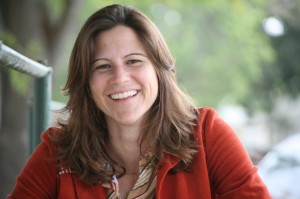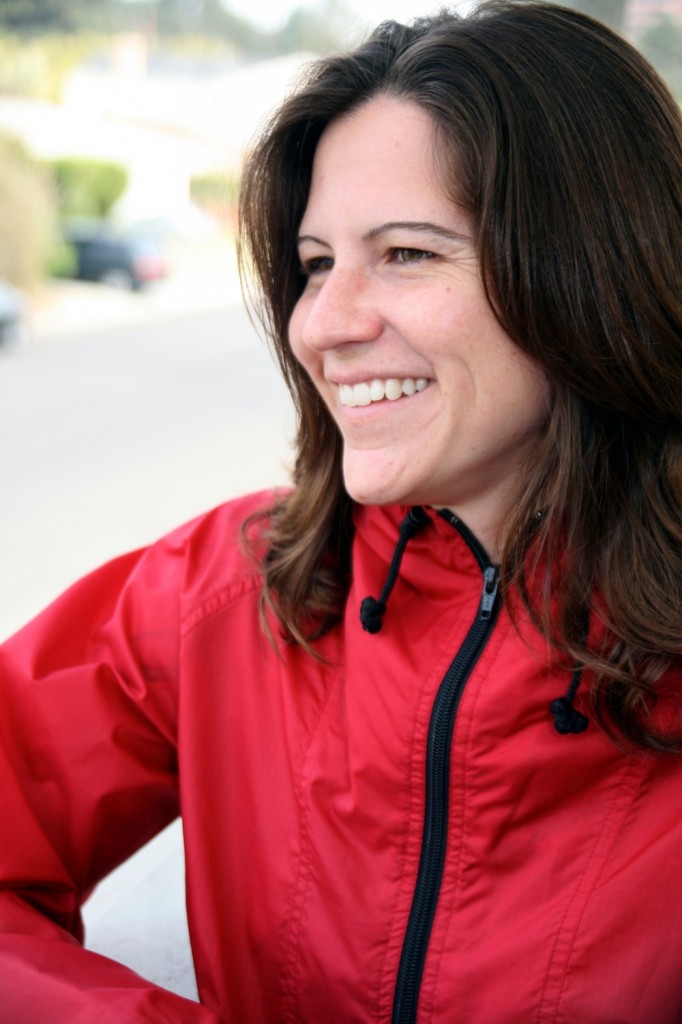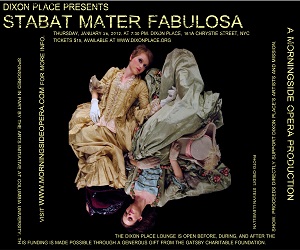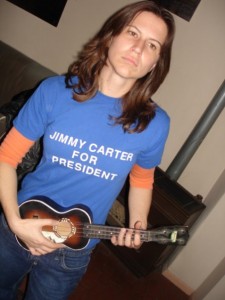
Carol Carpenter
The Happiest Medium was honored to be a Media Partner of the 2010 Planet Connections Festivities. Not only did we, as a team, get to interview some of the most talented writers and directors than any festival (or festivity for that matter) has to offer, but we made some lasting connections. One of them is Carol Carpenter – writer of the play Good Lonely People which was also directed by our wonderful staff contributor, Diánna Martin. Carol was not only nominated for her work but also won! We were thrilled to be able to celebrate this night with her – and I’m honored that she took some time to sit down and tell us what this time in her life has been like. Surprisingly, it’s been an unexpected path . . .

Carol – Congratulations on winning your award for Outstanding Playwriting for a New Script at the Planet Connections Award Ceremony! I wasn’t able to review Good Lonely People for this site since the director (the fabulous Diánna Martin) is a contributor for us. But just between you and me, I was really moved by your play. At the heart of it, what is Good Lonely People about to you?
It’s about a mother who loves her gay daughter so deeply that she’s willing to take on anything that threatens her child — including her own family. It’s also about the inherent goodness of people and our ability to overcome our own limitations in order to love. It celebrates the tenacity and value of family. And, I think, it’s a fascinating insight into conservative Christian culture and the ability of evangelicals to evolve in ways that us lefty snobs often assume they aren’t capable of. As for the world of Good Lonely People, that was one of my favorite aspects of the play — its strong sense of place. As a gay child of Southern Baptists who were politically left-leaning, I really enjoyed recreating the complex and sometimes contradictory world of old Southern Democrats confronting Proposition 8 on the night of the Obama election.
You’ve mentioned that Good Lonely People is very autobiographical – talk a little bit about the process of weeding through your life and picking the moments that you think will play well on stage.
I was raised in a tiny conservative town on the Texas-New Mexico border. So when I came out of the closet, as you can imagine, it was terrifying for me. But somehow, my parents handled it with incredible grace and love. Not that it was easy, but they wanted to understand and to support me in whatever ways that they could. My mother got her hands on every relevant book that she could and became the PFLAG librarian at the local chapter. My aunt and uncle, however, just couldn’t understand how this could possibly be ok. And this conflict became an unspoken issue underlying everything between our families for years. I always felt a certain amount of guilt for this, which is crazy I know, but I did. And I also felt anger toward my aunt and uncle. Good Lonely People was me working through all of that — figuring out how to transcend guilt and anger and find a place of insight that would lead to forgiveness and even a certain respect for who they are and what they believe. So the climax of the play, when the mother faces off with the aunt and uncle, that’s me looking my worst nightmare in the eye. Isn’t that always what makes the best dramatic moment onstage — your worst nightmare?
It’s interesting to chart the evolution of how I got to the place where I could write this play. A few years ago, my aunt had a heart attack and then last year my father’s cancer became serious. I suddenly realized that they wouldn’t be here forever. And so I reached out to my cousin and said, “I’d really like to stop in and see your mom and dad when I drive through the area, but I’m always with my partner and I don’t want to make them uncomfortable. But they’re not going to be here forever and I’d really like to see them. Could you ask them if it would be ok for me to stop in, even if I have Nora with me?” It was the first time that this issue had ever been directly addressed like this. And the way in which I addressed it — with respect for their values — I think, opened the door to healing for everyone. It opened their hearts in ways that had been closed before because it left politics at the door. The success of that moment started me on a journey in which I realized that, on the one hand, while my fifteen years of in-your-face gay politics had certainly accomplished important things, I had also alienated people in my life who mattered – people who had raised me and sacrificed for me. That simple gesture of respect — which was so hard to get to — eventually grew into this play. I’m hoping Good Lonely People softens the audience around the complexities of gay and religious issues. What happens when we assume everyone is doing their very best with the cards they’ve been given?
A few weeks ago, my father passed away and it was just incredible to watch the community embrace my partner Nora out of respect for my Dad, who was a kind, gentle man. Here we were in a Baptist church in a tiny town on the Texas border. The community members were all seated in the church as our family entered and walked down the aisle. My brother entered with his wife, and then Nora and I followed them in. We were clearly together, as a couple. We sat next to my old aunt and uncle (that the play is based on) at the service. There was a slide show of my Dad’s life, and my and Nora’s pictures were right there on the big screen alongside my brothers’ and their wives. After the service was over, all the little old church ladies that I remember growing up with were coming up to me, clasping my hand, and saying “I want to meet Nora!” I think they were so proud of themselves to have risen to that occasion. And I was so proud to be the daughter of a father who always assumed they could rise to that occasion. That’s the kind of humanity that I wanted to instill in Good Lonely People.
You’d mentioned that MTWorks Artistic Director and Resident Playwright, David Stallings, and MTWorks Executive Director and Resident Director, Cristina Alicea, did an amazing job of helping you turn Good Lonely People into what we wound up seeing. What was the biggest change that made this play really start to shine for you?
The Proposition 8 tie-in at the end. I missed that connection altogether – this started out as a play about the Obama election and this cast of unlikely characters who throw a party to celebrate his election. Sissy, the gay daughter, was always married in California to her partner, but I just completely missed how important that was to the conflict of the play. And while the election itself was symbolic and weighty, the final Proposition 8 moment gave the ending a magic touch while deepening Sissy’s journey and rounding out her character in a way that was lacking before. David and Cristina are also ruthless cutters. If the pacing isn’t there, they bring out the red ink, the razor. I love that — at least when the dramaturgs are talented like they are and share my goal of telling a good story that moves and enlightens people. If you’ve seen an MTWorks show, then you know they always feature top-notch scripts. That’s not an accident.
Good Lonely People has a lot of things in it that might be taken different ways, depending on what audience is seeing it. Tell me about a scene that gets a completely different reaction depending on what audience it’s playing to.
I’ve had two different gay women in their early 20s who were really mad at Sissy for not putting up a fight with her aunt and uncle. They really saw her as weak and spineless. But older audience members really love that choice and relate to or appreciate Sissy’s very conscious decision to deflect for what she sees as the greater good of the moment. To some, Sissy is a sellout and to others she is insightful and wise.
(A bit of shameless self promotion -but for a worthy cause! ) I was proud to be wearing a White Knot for Marriage Equality ribbon when I presented an award at Planet Connections. Talk to me about how Good Lonely People works as a play to enlighten people about Proposition 8.
I think it brings the issue home for people in a very soft and intimate way. The audience begins to feel like they’re a part of this family and when they realize at the end that Sissy’s life will be affected by this decision, it’s like “Oh. Wow. That vote had real ramifications for real people.” I think that in the overly politicized atmosphere of Prop 8 it’s easy to think that it was all really just about politics. My partner Nora is what they call a “professional gay”. She spent almost four years at the ACLU fighting for LGBT rights at the state level. And for both of us, it was easy to distance ourselves from the human perspective, because Prop 8 was the latest war to be won. But Good Lonely People cut through all that cultural noise and showed how Prop 8 was about real people, and their families.
Final question – bonus round. You can tell The Happiest Medium readers anything you want. Something about the play, about where you’re going from here, give me a recipe, tell me a joke, recite your favorite lyrics. This is your chance to do what you want. The floor is yours!
I’ll riff off the “where you’re going from here” idea because that’s on my mind a lot right now. The week before my dad passed, a very dear friend died unexpectedly and in a tragic way. She was my first serious girlfriend and the only woman besides Nora that I ever lived with. So I’ve been really trudging through the fog of death – I’ve started calling this the Summer of Sadness — and it’s made me pensive in ways I haven’t been in a long time. Paradoxically, in the midst of this sadness, I got my first New York production and I won the Best Playwriting award at the festival. But all of my losses have extinguished my elation. It’s like death has stripped me of my Big Moment. I’ve wondered why all these things would happen simultaneously, all within a six week period? And the only thing I can come up with is that its provided a stark contrast between what is important and what isn’t at a crucial time in my life. Instead of leveraging my Big Moment professionally, I’m immersed in memory, in the past, and in the people that I love. It’s provided the gift of clarity — a kind of compass that points to True North. So where am I going from here? I’m going toward True North.
_______
Thank you, Carol, for sharing your story with us. Congratulations on your well deserved win and be safe as you travel toward your North.
For more information about Carol you can check out her new site - which she warns is still under construction but will soon be the place where you can find all things Carol Carpenter related. I took a sneek peek and it’s great. Enjoy!




{ 3 comments… read them below or add one }
Carol is such a kind-hearted and amazing person – this was a wonderful interview. I’m so happy for her win at the awards. She deserves a lot of happiness.
Carol is one in a million. She has so many talents. We are blessed that she is sharing her writing with us and even more fortunate that her tales are making it to the stage.
Great interview! Great subject!
Let’s get this play to Santa Fe!
Cheers from a SouthWest West.